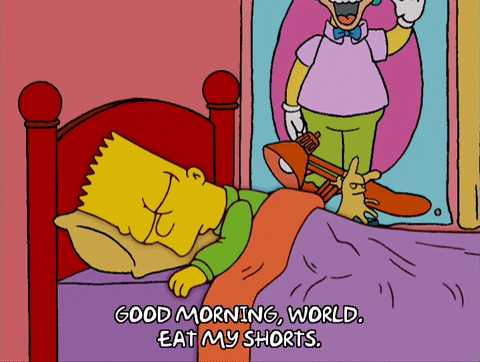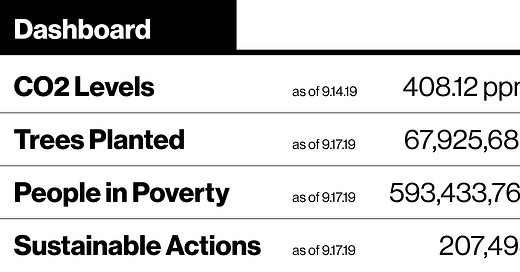⚡ You can soon eat your clothes
Good morning! Received a lot of good vibes yesterday from you all. Here’s today’s roundup.

Since the beginning of year, the people in poverty seem to be consistently decreasing, which is great news. However, we do want to note that our tracker shows it’s not decreasing fast enough to achieve the Sustainable Development Goals by 2030.
If you have any resources related to tracking global impact metrics and think we should add it to our daily dashboard, feel free to pass it along!

Climate Change vs. Your Dinner

The single biggest threat of climate change is the collapse of food systems, as a result of a rising human population and a plummeting food supply. In each decade going forward, the UN’s Intergovernmental Panel on Climate Change has predicted a 2-6% decline in global crop yields due to drought, weather volatility, flooding, and more. Disruptions in supply are already being seen almost everywhere that food is grown, from the Midwest to Europe to Mexico, and climate change is also intensifying the existing problems in industrial food production (e.g., food waste, soil degradation).
Counter Perspective: Yesterday, the Johns Hopkins Center for a Livable Future, released a study claiming that “achieving an adequate, healthy diet in most low- and middle-income countries will require a substantial increase in greenhouse gas emissions and water use due to food production.” Even though climate change is an existential threat to humanity, some “non-sustainable practices” may be necessary to support those who are most vulnerable today. How do we achieve the right balance?
Take a note, Bobby Axelrod
Mama Buci (meaning “Mother Honey”), started 10 years ago by a former hedge fund manager, has become Africa’s most prolific single-source honey producer. The Zambia-based organization, started by former hedge fund manager Martin Zuch, now provides more than 10,000 families with income. Zuch and his team give 10 hives to each family in the bush–these families then harvest the local honey and make between $50 and $200 a year by selling it back to Mama Buci, who in turn sell the honey in bulk to retailers in South Africa and Britain. Yes, this is a platform play in honey.
Child mortality rates 🔻
Childhood mortality rates have declined over the last two decades—almost by half, even as the world’s population has increased by a billion—as a result of work done by “governments and international aid groups to fight child poverty and diseases that are most lethal to poor children.” However, there are differences across and within countries, and if current rates of progress across regions continue, “nearly two-thirds of children in the poorest countries will still live in districts that won’t meet UN development goals by 2030.” A recent study has highlighted these disparities in the greatest geographic detail ever - you can find statistics by country and detailed analyses for 5 specific regions including India, Nigeria, Thailand, Southern Africa, and Haiti.
You can soon eat your clothes

Not really (well, probably not—who knows these days)… but, a number of innovative fashion companies are using synthetic biology to reduce the environmental impact of the fashion industry. Leaders in the space include:
MycoWorks: brewing leather made from mushrooms
Modern Meadow: building materials with biology (like turning yeast into leather)
Evrnu: turning discarded clothing fibers into new clothing
Spiber: creating synthetic spider silk (10x tougher than steel!)
Read more about them, and other incredible companies, here!

Mr. and Mrs. Incredible on Combating Inequality

Okay, it’s not actually Mr. and Mrs. Incredible, but it pretty much could be—Bill & Melinda Gates have done incredible work to combat inequality through their foundation. This morning, they released a perspective on a more targeted approach to tackling inequality—see below for an excerpt, and we highly recommend reading the full thing:
When you start to understand global inequality at the local level, it changes how you think about interventions.
If the goal is for low-income countries to close the gap with high-income countries, then the average is all that matters. Many governments and development organizations have concentrated on reaching those who are easiest to reach… Life typically gets better for the best-off first, and then, gradually, for everyone else. Eventually, over the course of decades or centuries, the poorest mostly catch up…
But people who are unhealthy and uneducated today don’t have decades or centuries to wait. Moreover, in countries where some people are already doing well, the quickest way to raise the average is to concentrate on those who aren’t.
In short, governments—and philanthropies like ours—need to hurry up, and that means replacing the trickle-down approach with precise targeting. The key is identifying those in need, analyzing how to help, and delivering solutions directly to them. And a few governments around the world are starting to experiment with doing just that.

Morgan DeBaun, Co-founder of Blavity

What was your life like when you decided to create Blavity?
I worked in different parts of [Intuit], one of which was a start up that had been acquired by the company. So I moved to San Francisco, and as part of that, I found myself in your typical start up environment, even though I was working for this big company. It was very much like, lots of beer and dogs running everywhere.
I found myself thinking 'Is this really the world that I want to live in for the rest of my life?’ See the rest of the interview here.
Blavity is a community of the most exceptional multi-cultural creators and influencers in the world. We partner with diverse content creators and influencers to help them reach a wider audience, amplify their message, and fund their hustles. We believe that the world shifts according to the way people see it— and if you change the way people view the world, you can transform it.


Inconspicuous Consumption: The Environmental Impact you Don’t know you have
“To put it more simply: More goats to meet increasing [cashmere] demand ... means there is more grazing, and therefore more desertification, so the goats are undernourished, which makes their hair coarser, causing the supply of high-quality cashmere to shrink, causing the herders to breed more goats to try to meet the demand for better cashmere, and on and on forever until, once again, the world collapses in on itself like a dying star.”

How to Build a Global Community in a World of Nationalism?: Today, globalism has a bad reputation. 'Citizens of the world' are depicted as recklessly uninterested in how international economic networks can affect local communities. Meanwhile, nationalists are often derided as racists and bigots. But what if the two were not so far apart? What could globalists learn from the powerful sense of belonging that nationalism has created? Faced with the injustices of the world's economic and political system, what should a responsible globalist do?
Digital Global Climate Strike: This September 20th, millions of people will join young climate strikers in a Global #ClimateStrike on the streets and demand an end to the age of fossil fuels. Anyone with an online presence has an opportunity to join in and “go green” with a digital strike.
If you’re in NYC, the strike will start at Foley Square (Centre and Worth) at 12pm EST on Friday. See you there!
If you like what you read, please click on the heart below & continue sharing this newsletter!
Tomorrow is a daily impact newsletter for changemakers who care about the world. Our purpose is to bring you the news and stories about people making a difference.


